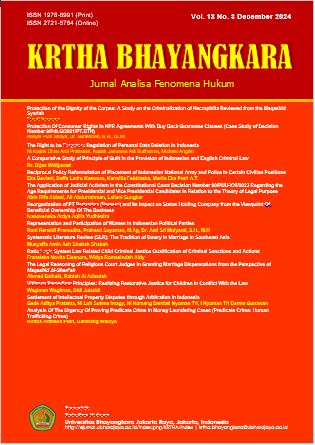Legalization of Deed of Establishment of Limited Liability Company Fintech Without Permit from Financial Services Authority (OJK)
DOI:
https://doi.org/10.31599/krtha.v19i1.3614Keywords:
Deed of Incorporation , Fintech, Legality of the Deed, Notary, Financial Services AuthorityAbstract
Fintech companies engaging in crowdfunding services based on information technology (LPBBTI) are required to establish a deed of incorporation as a limited liability company (PT) through a notary and obtain a license from the Financial Services Authority (OJK). However, there is a phenomenon where fintech companies that are already established as PTs operate without a license from OJK. The primary issue to be analyzed is the legal consequences on the validity and existence of the incorporation deed that has been created by the notary and whether it can be revoked or erased due to the company being classified as ilegal. The research approach used in this study is a normative juridical approach, focusing on the use of secondary data as references, with qualitative data as the type of data employed. The establishment of a PT is a requirement from OJK that must be fulfilled by fintech companies. For fintech companies that engage in LPBBTI activities without a business license, criminal sanctions can be imposed. Additionally, the notary is not obligated to ensure that the fintech company has obtained a business license from OJK. The deed of incorporation of the PT remains legally valid, even if the fintech company does not have a business license from OJK, because the incorporation deed serves as evidence that the PT is registered as a legal entity, and it does not result in the annulment or removal of the deed of incorporation.
References
Aprita, S. (2021). The Role of Peer-to-Peer Lending in Providing Funding for Small and Medium Enterprises. Samudera Keadilan Law Journal, 16(1)
Baihaqi, J. (2018). Financial Technology Peer-to-Peer Lending Based on Sharia in Indonesia. Tawazun: Journal of Sharia Economic Law, 1(2)
Cindarputera, R., & Putra, M. F. M. (2022). The Authority of Notaries in Legal Counseling and Mediation. Journal of Social Science and Education (JISIP), 6(3)
Hutahaean, B. (2013). The Application of Sanctions for Child Offenders. Judicial Commission Journal, 6(1)
Irawansah, D. (2021). The Urgency of Forming a Financial Technology Law in Indonesia: Hopes and Realities in the COVID-19 Pandemic Era. SASI Journal, 27(4)
Kristian, O. Y. (2022). Legal Protection for Users of Fintech P2P Lending Services from Economic Crimes and Against Providers of Illegal Fintech P2P Lending Services. National Law Magazine, 52(2)
Maisarah, S. (2022). The Mechanism of Establishing a Fintech Lending Business (Online Loans) Based on Legislation. Badamai Law Journal, 2(2)
Munalar, S. S., et al. (2022). The Role of Notaries in Managing the Business License for Limited Liability Companies (A Juridical Review of Government Regulation No. 24 of 2018 on Integrated Business Licensing Services Electronically). Bhakti Hukum, 1(1)
Pakpahan, E. F., et al. (2020). The Urgency of Regulating Financial Technology in Indonesia. Darma Agung Journal, 28(3)
Putra, F., & Anand, G. (2018). Legal Protection for Parties Harmed by Legal Counseling by Notaries. HUMANI (Law and Civil Society), 8(2)
Rumadanu, Friko, Esther Masri, & Otih Handayani. (2022). The Use of Cyber Notary in Authentic Deeds and Their Evidentiary Power from the Perspective of the Notary Position Law. KRTHA Bhayangkara, 6(1)
Sari, S. F. D. N. (2018). The Role of Notaries in the Process of Establishing a Limited Liability Company Deed. Lex Renaissance, 3(2)
Sugangga, R., & Sentoso, E. H. (2020). Legal Protection for Online Loan Users. Pakuan Justice Journal of Law, 1(1)
Wardhani, I. K. (2020). Legal Protection for Lenders Against Credit Risks in Online Loan Transactions Based on Information Technology. Mimbar Justitia Law Journal, 6(2)
Hakim, L., & Hapsari, R. A. (2022). Financial Technology Law. Indramayu: Adab Publisher
Manurung, A. H. (2013). Financial Services Authority: Investor Protection. Jakarta: Adler Manurung Press
Marzuki, P. M. (2014). Introduction to Legal Research. Jakarta: Prenada Media Group
Masduki, T. (2022). Smart Book of Legality: Legal, Certified, and Safe Businesses. Jakarta: Ministry of Cooperatives and SMEs
Sastrawidjaja, S. (1995). Criminal Law I. Bandung: Armico
Sidabalok, J. (2014). Consumer Protection Law in Indonesia. Bandung: Citra Aditya Bakti
Zainal, A. (2012). Introduction to Indonesian Law. Jakarta: Rajawali Press
Regulation of the Financial Services Authority of the Republic of Indonesia No. 10/POJK.05/2022 on Peer-to-Peer Lending Based on Information Technology
Law of the Republic of Indonesia No. 2 of 2014 on Amendments to Law No. 30 of 2004 on the Position of Notary
Law of the Republic of Indonesia No. 4 of 2023 on Strengthening and Developing the Financial Sector
Law of the Republic of Indonesia No. 40 of 2007 on Limited Liability Companies
Administrator. (2024, September 1). The Development of Fintech in Indonesia and Its Positive Impact. Upitra. Retrieved from https://www.upitra.ac.id/berita/read/perkembangan-fintech-di-indonesia#:~:text=Memudahkan%20dalam%20Mendapatkan%20Modal%20Usaha,untuk%20mendapat%20modal%20berbunga%20modal
Adyahardiyanto, A. (2023, August 31). 3 Advantages of PT Compared to Other Business Forms. Smartlegal. Retrieved from https://smartlegal.id/badan-usaha/pendirian-pt/2023/07/10/3-kelebihan-pt-dibandingkan-bentuk-usaha-lain/
Financial Services Authority. (2024, July 12). List of Licensed Fintech Lending Providers by OJK as of July 12, 2024. Retrieved from https://ojk.go.id/id/kanal/iknb/financial-technology/Pages/Penyelenggara-Fintech-Lending-Berizin-di-OJK-per-12-Juli-2024.aspx
Financial Services Authority. (2019, September 1). FAQ: General Categories. OJK. Retrieved from ojk.go.id/id/kanal/iknb/data-dan-statistik/direktori/fintech/Documents/FAQ%20Fintech%20Lending.pdf
Thomas Aryanto. (2023, September 23). Can Founders Conduct Legal Acts Before a PT Has Legal Status?. Hukumonline. Retrieved from https://www.hukumonline.com/klinik/a/bisakah-pendiri-melakukan-perbuatan-hukum-sebelum-pt-berbadan-hukum-lt640ef7fb75080/
Downloads
Published
Issue
Section
License
Copyright (c) 2025 Sultan Alvaro Dwiyanto, Alfi Taufiq Asyidqi

This work is licensed under a Creative Commons Attribution 4.0 International License.



































